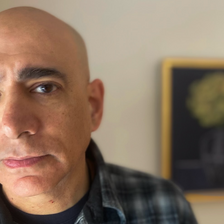The Electronic Intifada London 18 October 2012

The many books Moukaddem used for research, but ultimately realized he didn’t need (film still)
The boldly titled feature-length documentary How We Can Solve The Palestinian Israeli Problem (which can be viewed online) is the work of Sami Moukaddem, a multi-talented Lebanese psychologist and musician living in Ireland.
Early on, Moukaddem speaks to the camera and says he has no experience as a filmmaker, and that he just wanted to make a film to explain the basic issues: “I simply got tired of western mainstream media presenting the Palestinian-Israeli issue as being complex,” he says. He then narrates from a first-person perspective throughout.
Bookmarking this introduction is a short section at the end of the film explaining how he made the film itself. Moukaddem clearly wants to encourage activists to make their own movies.
The film is indeed rough around the edges, and the sound quality in some of the interviews is not great. But Moukaddem makes up for his inexperience with the quality of its content, his enthusiasm, the wide range of interviewees and the filmmaker’s sheer charm.
The movie’s framework is the journey Moukaddem takes to educate himself in preparation. We see a shot of a vast pile of books about Palestine. Moukaddem says he read so many books “while asking myself, ‘how much does one need to know before taking a stand?’” He adds: “Eventually I came to the conclusion that I needed to know less, not more, and just explain the basics and let them speak for themselves.”
Eloquence
The bulk of the film is taken up by interviews with eloquent speakers, academics and journalists, most of whom will be familiar to Electronic Intifada readers. They include Palestinian writer Ghada Karmi, anti-Zionist Israeli historian Ilan Pappe, former Guardian journalist David Hirst, Palestinian editor and commentator Abdel Bari Atwan and venerable leftist guru Noam Chomsky.
Contributors to The Electronic Intifada, Jonathan Cook, David Cronin and Ben White, are also interviewed.
Moukaddem also sits down with Michael Higgins, in an interview recorded prior to his election as president of Ireland. Higgins condemns the “collective punishment” of Gaza, and astutely observes of Israeli propaganda that “the colonizer can only live with themselves rationally by distorting the image of the colonized.”
Founder of the boycott, divestment and sanctions (BDS) movement, Omar Barghouti talks to Moukaddem about the surfeit of fluent English-speaking Israeli spokespeople that appear on our TV screens: “There’s plenty of good [Arab] spokespeople out there, men and women, who know the language and who can speak very rationally, but they’re not selected by the media.”
Wide range
The film gives a potted history, from the origins of Zionism to the 1948 expulsion of 750,000 Palestinians in the Nakba on to the present day. It skates very lightly over a wide range of topics, for example: Gaza, Palestinians inside Israel and the West Bank. Maps and charts are utilized, and various myths are debunked throughout. There are discussions of the Israel lobby, Christian Zionism and the never-ending “peace process.”
But overall, Moukaddem has clearly put in a lot of hard work to get so many good speakers. The final sections of the film look at what is being done to try to make things right, with the emphasis on equality and human rights. Moukaddem has a refreshingly humanist sensibility. He is humble enough to know he does not have all the answers, and the film benefits from his having sought out a wide range of speakers.
This attitude endears him to the audience, as do his occasional personal musings on things like the Palestinian best friend he grew up with, who was denied equal rights by the Lebanese government.
With its ultimate emphasis on action, including BDS, this documentary is a good tool for campaigning groups to use to educate introductory audiences.
The entire film can be watched free of charge on the website: www.palestine-israel-problem.com
Asa Winstanley is an investigative journalist from London who has lived and worked in occupied Palestine.






Comments
This film
Permalink Charlton Price replied on
This is the best single source available for all the essential facts. It makes the clearest and most compelling explanation I've seen on how to takeng action for positive change, especially programs of Boycott, Divestment and Sanctions (BDS).. I am distributing the notice about this film to a couple of dozen people worldwide who I believe should see this film . Many of these people will pass the word to others.
translation to spanish
Permalink Grupo de Amistad Argentina Palestina de Neuquén replied on
Have you any version subtitled or spoken in Spanish? Please show it to us.
An eloquently simple and
Permalink Ellen Murphy replied on
An eloquently simple and clear piece of truth. I don't want it marred by a need for some editing in mistakes of fact and simple spellings. Please correct the description of Denis Halladay as "Former Secretary General
of the UN," and later as "Assistant (the same)." Come now. Get his title right. A little way before the intermission (sweet) was "finalize it's borders."
Remove the apostrophe. There are a few more. Just proof it. This is too valuable !
Film to be corrected
Permalink Sami Moukaddem replied on
It seems that an earlier version of the film was mistakenly uploaded. I am currently away from home, will correct the film upon return. Yes, you are so right - many thanks for the comment. Sami Moukaddem